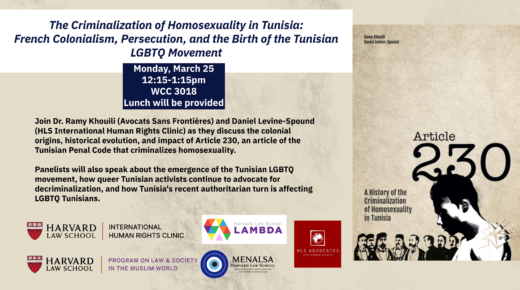Lectures & Panels The Criminalization of Homosexuality in Tunisia: French Colonialism, Persecution, and the Birth of the Tunisian LGBTQ Movement

Ramy Khouili and Daniel Levine-Spound discuss the colonial origins, historical evolution, and impact of Article 230, an article of the Tunisian Penal Code that criminalizes homosexuality.
Event Overview
Join Dr. Ramy Khouili (Avocats sans Frontières) and Daniel Levine-Spound (Harvard International Human Rights Clinic) as they discuss the colonial origins, historical evolution, and impact of Article 230, an article of the Tunisian Penal Code that criminalizes homosexuality.
In 2015, six men from Kairouan, Tunisia, were arrested, violently interrogated, forced to undergo anal examinations, and sentenced to three years in prison. Their alleged crime? Violations of Article 230: “Sodomy.”
The case of the “Kairouan six” made headlines domestically and internationally. Taking advantage of increased freedom of expression following the country’s 2011 revolution, Tunisia’s nascent LGBTQ movement mobilized, providing support for the accused and shedding light on the devastating impacts of Article 230. Increasingly, activists began to question where Article 230 came from and what the law criminalized.
In addition to discussing the history and contemporary application of Article 230, panelists will speak about the emergence of the Tunisian LGBTQ movement and how queer Tunisian activists continue to advocate for decriminalization. Finally, panelists will discuss Tunisia’s recent authoritarian turn and how the end of Tunisia’s democratic experiment is affecting LGBTQ Tunisians.
Lunch will be provided.
This event is sponsored by the International Human Rights Clinic, the Program on Law and Society in the Muslim World, HLS Advocates for Human Rights, Harvard Law School LAMBDA, and the Middle Eastern and North African Law Students Association.